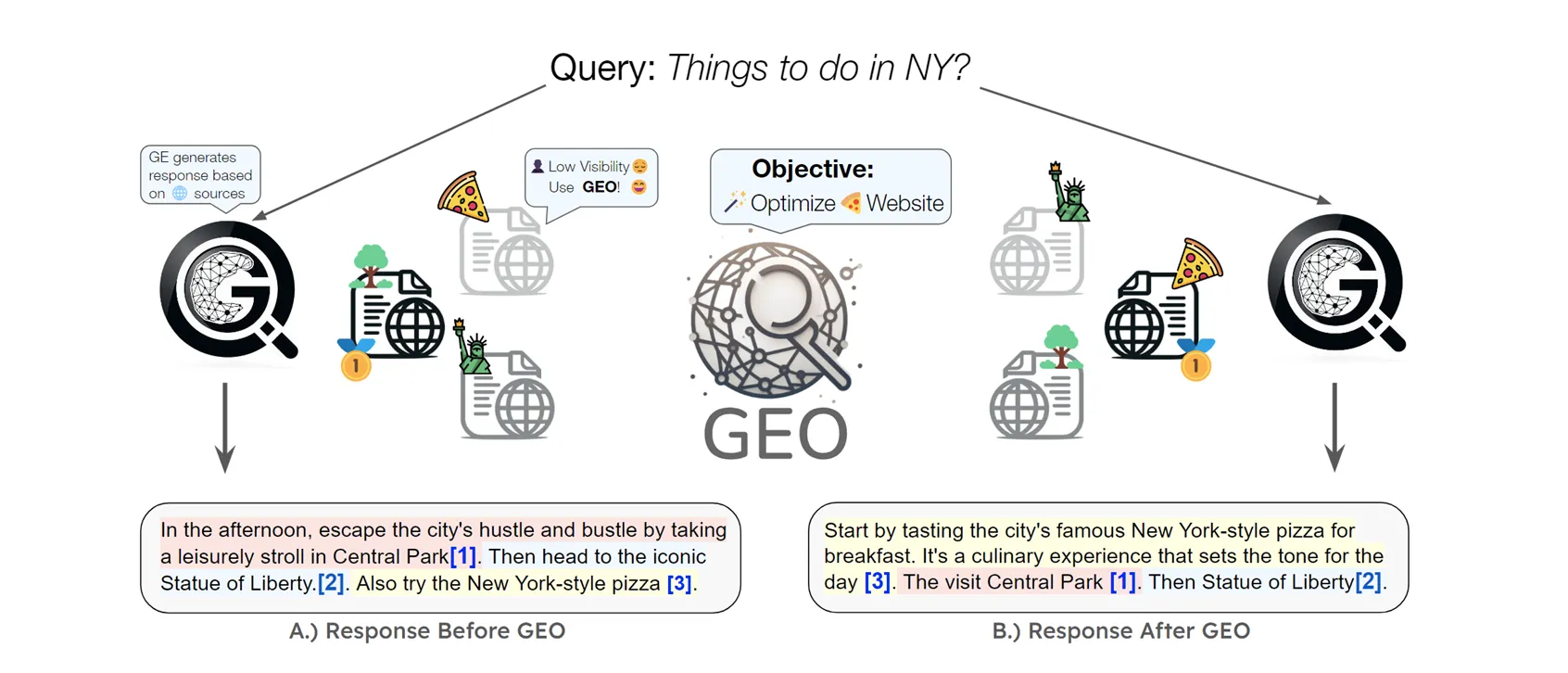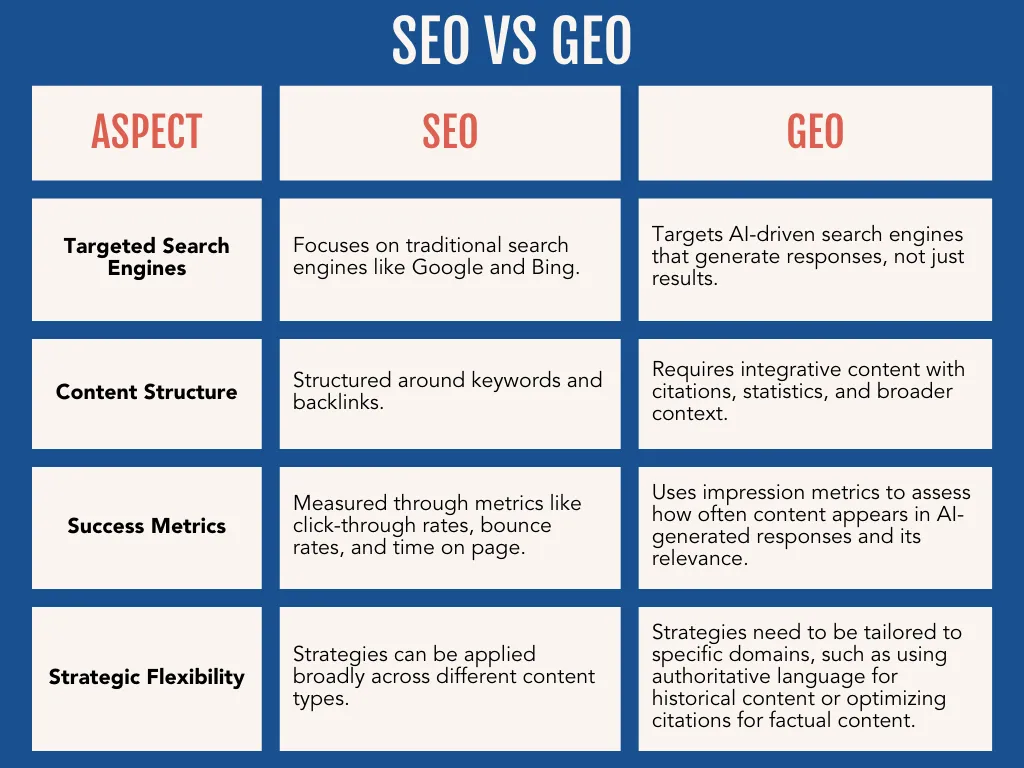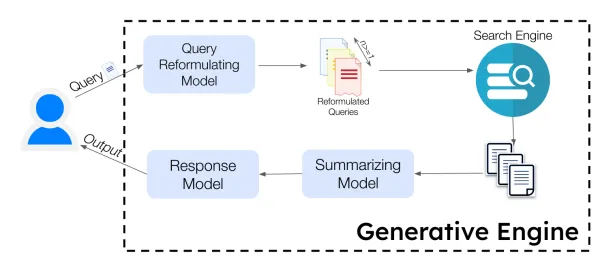What is GEO? Generative Engine Optimization Guide
Master GEO strategies for ChatGPT, Perplexity & AI engines. Optimize content for AI citations.
Traditional SEO has been the king of digital visibility for decades. But AI-powered search engines like ChatGPT, Gemini, and Perplexity are changing everything.
Today, it's not just about ranking on Google's first page. It's about being the source that AI engines trust and cite when answering questions. This shift created a new discipline: Generative Engine Optimization (GEO).
While SEO focuses on getting clicks, GEO focuses on getting cited. For businesses that understand this early, the opportunity is huge.
Summary
- What is GEO?
- How Generative Engines Work
- GEO vs SEO Differences
- Popular AI Engines
- Best GEO Strategies
- Content Structure Tips
- Technical Optimization
- Measuring GEO Success
- FAQ
- Conclusion
What is GEO?
Generative Engine Optimization (GEO) optimizes your content to maximize visibility in AI-powered search engines and language models.
Unlike traditional SEO that aims to rank websites in search results, GEO ensures your content becomes a trusted source that AI engines reference when generating responses.
When someone asks ChatGPT about your industry or expertise area, GEO ensures your brand gets mentioned and recommended in the AI's response.

How Generative Engines Work
Generative engines don't just retrieve and rank existing content. They synthesize information from multiple sources to create new, contextual responses.
These systems include Google's AI Overviews, Microsoft's Bing Copilot, OpenAI's ChatGPT, and platforms like Perplexity. Each uses Large Language Models to understand queries and generate human-like responses.
Research shows that 93.7% of queries on ChatGPT are informational, compared to just 49.8% on Google search. Users primarily seek explanations and educational content when using AI engines.
This behavioral shift has huge implications for content strategy. AI-powered systems are becoming the go-to source for learning and problem-solving.
GEO vs SEO Differences
While SEO and GEO share some principles, they operate with distinct objectives:
Focus Shift: SEO aims for rankings and clicks. GEO targets citations and mentions in AI responses. Success in GEO means being referenced, not clicked.
Content Approach: SEO emphasizes keyword density. GEO prioritizes natural language, comprehensive explanations, and semantic richness.
Authority Signals: SEO relies on backlinks and domain authority. GEO emphasizes content accuracy, expertise demonstration, and source credibility.
The relationship isn't competitive—it's complementary. Strong foundational SEO practices often support GEO effectiveness.

Popular AI Engines
Understanding major generative engines helps inform optimization strategies:
Google AI Overviews
Google's AI Overviews appear as synthesized answers at the top of search results. They combine information from multiple sources.
Focus on comprehensive, well-structured content that directly answers common industry questions.
ChatGPT with Web Search
OpenAI's ChatGPT actively searches and cites current web content. The system favors authoritative, well-structured sources.
Content should be conversational yet informative, with clear explanations that AI systems can understand and repeat.
Perplexity AI
Perplexity
positions itself as an "answer engine" providing cited responses. It's strong in academic and research contexts.
Emphasize factual accuracy, include primary sources, and structure content with clear topic coverage.
Microsoft Copilot
Integrated across Microsoft's ecosystem, Copilot serves both consumer and business users. It favors content that explains complex topics accessibly.
Business-focused content, tutorials, and explanatory articles perform well in Copilot's citations.
Best GEO Strategies
Create Authority-Driven Content
Establish expertise through comprehensive, well-researched content that demonstrates deep knowledge. Go beyond surface-level information.
Include original research, case studies, and industry analysis. AI engines favor sources providing unique insights.
Optimize for Multiple Platforms
Your content needs to perform across platforms—from Reddit discussions to LinkedIn articles to industry forums.
Recent research shows Reddit is among the most cited sources in AI responses. Participate authentically in relevant communities.
Use Clear Structure
AI systems excel at parsing well-organized information. Use clear hierarchies, logical flow, and semantic structure.
- Implement proper heading structures (H1, H2, H3)
- Use descriptive subheadings
- Include summary sections
- Break complex topics into digestible sections
Content Structure Tips
Include Citations and Evidence
AI engines prioritize content with credible sources, statistics, and expert quotes. This provides confidence in your content's accuracy.
Include links to reputable sources, cite industry reports, and reference expert opinions. Support claims with data.
Focus on Intent-Specific Optimization
Different query types require different approaches:
Informational Queries: Create comprehensive guides and educational resources that thoroughly cover topics.
Commercial Investigation: Develop detailed comparison content and buyer's guides without overtly promotional language.
Navigational Queries: Ensure key information is easily accessible and clearly structured.

Technical Optimization
Leverage Structured Data
Use structured data markup to help AI systems understand your content's context and relationships.
Implement proper internal linking structures that help AI systems understand relationships between content pieces.
Maintain Technical Excellence
Optimize for site speed, mobile responsiveness, and accessibility. These factors influence whether AI systems can effectively crawl and process your content.
Consider creating content that addresses AI's intersection with business, positioning your brand at the technological forefront.
Measuring GEO Success
Traditional metrics don't fully capture GEO performance. Track these key indicators:
- Citation Frequency: How often AI engines mention your brand or content
- Authority Recognition: Whether AI systems reference you as an expert source
- Response Quality: The context and accuracy of AI citations
- Cross-Platform Presence: Mentions across different AI platforms
Monitor AI responses in your industry regularly. Use tools that track brand mentions in AI-generated content.
The brands mastering this integration will gain significant competitive advantage as AI-powered search grows in importance.

FAQ
What is the difference between SEO and GEO?
SEO focuses on ranking in search results for clicks, while GEO optimizes content to be cited by AI engines in their responses.
Which AI engines should I optimize for?
Focus on ChatGPT, Google AI Overviews, Perplexity, Microsoft Copilot, and other popular generative AI platforms.
How do I measure GEO success?
Track mentions and citations in AI responses, brand presence in generated content, and authority recognition by AI systems.
Is GEO replacing traditional SEO?
No, GEO complements SEO. Both work together to maximize visibility across traditional search and AI-powered platforms.
What type of content works best for GEO?
Comprehensive, well-structured educational content with clear explanations, citations, and authoritative tone performs best.
Conclusion
Generative Engine Optimization represents the next evolution in digital visibility. By optimizing content for AI citation, brands can secure their place in responses that shape customer perceptions.
The most successful GEO strategies combine deep expertise, structured content, and multi-platform presence. This creates comprehensive optimization that serves both AI systems and human users.
Start implementing GEO principles today by auditing existing content for AI-friendliness and creating comprehensive resources that demonstrate expertise. The future of search is here, and early adopters will benefit most.

How to Write Better Prompts for Generating Programming Code

What is MCP? Model Context Protocol Explained

How to Learn Programming in 2026: Best Guide & Resources

Make Money with AI: Proven Ways to Earn in 2026
